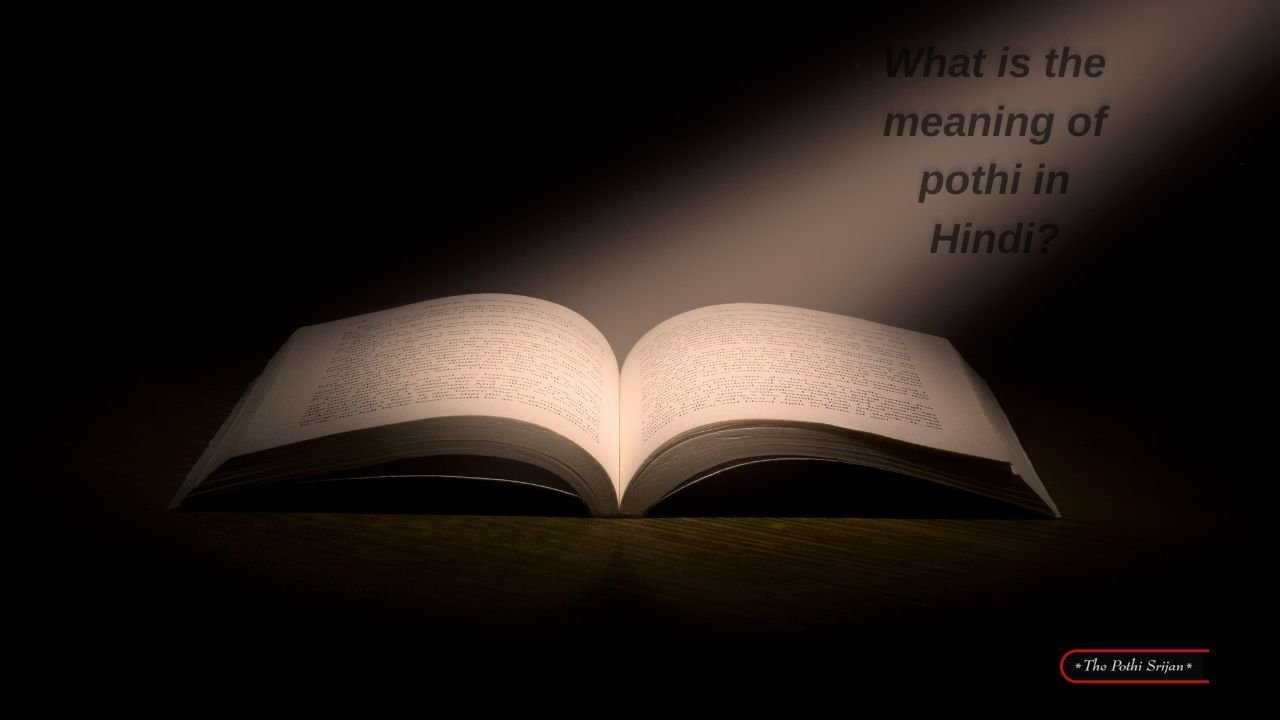Perplexed by the meaning of the term “pothi” in Hindi? Look no further! In this educational tutorial, we will explore the various connotations of the word “pothi” in Hindi language and culture. From its historical origins to its modern-day usage, we will delve into the significance and symbolism of pothis in Indian literature and religion. By the end of this post, you will have a comprehensive understanding of the multifaceted meaning of pothi in Hindi.
Key Takeaways:
- Pothi in Hindi refers to a small book or manuscript. It is commonly used to describe religious scriptures or traditional texts.
- The word “pothi” is derived from Sanskrit. It is often associated with ancient Indian literature and carries cultural significance.
- Pothi also holds symbolic meaning in Indian traditions. It represents knowledge, wisdom, and spirituality, and is revered in religious ceremonies and rituals.
Understanding Pothi
Assuming you are curious about the meaning and significance of the term “pothi” in Hindi, let’s delve into its definition, etymology, and historical role in Indian society. Pothi holds a significant place in Indian culture and has been an integral part of the country’s literary tradition for centuries.
Definition and Etymology
Etymology of the word “pothi” traces its origins to the Sanskrit word “pustakam,” which loosely translates to “book” in English. In Hindi, pothi refers to a small book or manuscript, typically containing religious or philosophical texts. The term is often associated with ancient scriptures and religious writings, reflecting its cultural and literary significance.
Pothi has been a fundamental medium for preserving and transmitting knowledge, particularly in religious and spiritual contexts, contributing to the rich tapestry of Indian literature and cultural heritage.
Historical Role in Indian Society
One of the fascinating aspects of pothi is its historical role in Indian society, where it served as a means of documenting and preserving knowledge. Pothi manuscripts have been instrumental in the preservation of religious and philosophical teachings, folklore, and historical accounts, providing valuable insights into the intellectual and cultural history of India.
Indian scholars and scribes meticulously transcribed and illustrated pothis, often using traditional materials such as palm leaves or handmade paper. These manuscripts played a crucial role in disseminating knowledge and shaping the intellectual discourse in Indian society, influencing generations of scholars, poets, and thinkers.
Indian pothis offer a glimpse into the diverse literary and intellectual traditions of the region, showcasing an extraordinary array of subjects, including mythology, poetry, philosophy, and scientific treatises. These historical artifacts serve as a testament to the enduring legacy of pothi in shaping India’s cultural and intellectual landscape.
“`html
Pothi in Practice
Some of the most fascinating aspects of pothi in Hindi culture can be seen in its practical applications. Whether through traditional materials and construction methods or the preservation of sacred texts, the significance of pothi is deeply embedded in various aspects of everyday life.
Traditional Materials and Construction
The use of natural materials such as handmade paper, cloth, and wood in the creation of pothi reflects a reverence for traditional craftsmanship. The process of binding the pages together with thread or string further emphasizes the attention to detail and the artistry involved in producing these sacred texts. The tactile experience of holding and reading a pothi is a testament to the meticulous care taken in its construction, making it a cherished item in Hindi culture.
Preservation of Sacred Texts
Sacred texts hold a special place in Hindi traditions, and the preservation of pothi is of utmost importance. Whether stored in temples, passed down through generations, or meticulously copied by scribes, the commitment to safeguarding these texts ensures their continued relevance and significance. Sacred texts are not only valued for their content but also for the physical embodiment of cultural and religious heritage that they represent, making their preservation a vital aspect of Hindi culture.
It is imperative to understand the traditional materials and construction methods used in pothi, as well as the ongoing efforts to preserve and protect sacred texts for future generations to appreciate and cherish.
“`
Pothi in Modern Times
Despite the rapid advancement of technology and the digitalization of literature, the traditional concept of ‘pothi’ continues to hold significance in modern times. The term ‘pothi’ has evolved to encompass a wider range of written material, reflecting the changes in the way we consume and engage with literature.
Pothi’s Transition into the Digital Age
Digital technologies have revolutionized the way pothi are created, accessed, and preserved. The traditional hand-written pothi has now been adapted into digital formats, allowing for easier dissemination and preservation of cultural and religious texts. This transition has ensured the longevity of pothi in a world increasingly dominated by digital content.
The Continuing Importance of Pothi in Learning and Worship
For scholars and practitioners alike, pothi continue to serve as invaluable resources for learning and worship. The tactile experience of engaging with pothi, whether in physical or digital form, fosters a deeper connection to the text and its teachings. To this day, pothi remain integral to the preservation and transmission of cultural and religious knowledge, enriching the lives of individuals and communities.
To scholars, practitioners, and enthusiasts of literature and religion, the enduring relevance of pothi reflects the resilience and adaptability of traditional knowledge in an ever-changing world.
Conclusion
Ultimately, the meaning of the word “pothi” in Hindi refers to a book or a collection of religious or poetic verses. Its roots can be traced back to ancient Sanskrit literature, depicting the significance and reverence for written texts in Indian culture. Understanding the meaning of “pothi” provides valuable insight into the linguistic and cultural heritage of the Hindi language. It serves as a reminder of the rich literary tradition and the importance of literature as a means of preserving history, knowledge, and spiritual wisdom in Indian society. Embracing this understanding contributes to a deeper appreciation for the profound influence of language and literature in shaping the cultural identity of a people.
FAQ
Q: What does the term “pothi” mean in Hindi?
A: The term “pothi” in Hindi refers to a traditional manuscript or sacred text, often written on paper or palm leaves and bound in a cover. These texts can include religious scriptures, folk tales, and other literary works.
Q: How is the term “pothi” used in Indian culture?
A: In Indian culture, “pothi” is used to refer to a variety of written texts that hold significance in religious, cultural, and literary contexts. These texts are often revered and treated with great respect.
Q: Are there different types of “pothi” in Hindi culture?
A: Yes, there are various types of “pothi” in Hindi culture, including religious scriptures such as the Bhagavad Gita, Ramayana, and Quran, as well as literary works like Kabir’s poetry and folk tales. Each type holds its own unique cultural and historical significance.
Q: How are “pothi” texts preserved and transmitted through generations?
A: “Pothi” texts are traditionally preserved and transmitted through oral traditions, handwritten manuscripts, and later, through printed books. These texts are often passed down from generation to generation and continue to be studied, recited, and revered.
Q: What role do “pothi” texts play in contemporary Hindi society?
A: In contemporary Hindi society, “pothi” texts continue to hold cultural, religious, and literary significance. They are studied, performed, and celebrated as important elements of the cultural heritage of India, contributing to a rich tapestry of traditions and beliefs.









